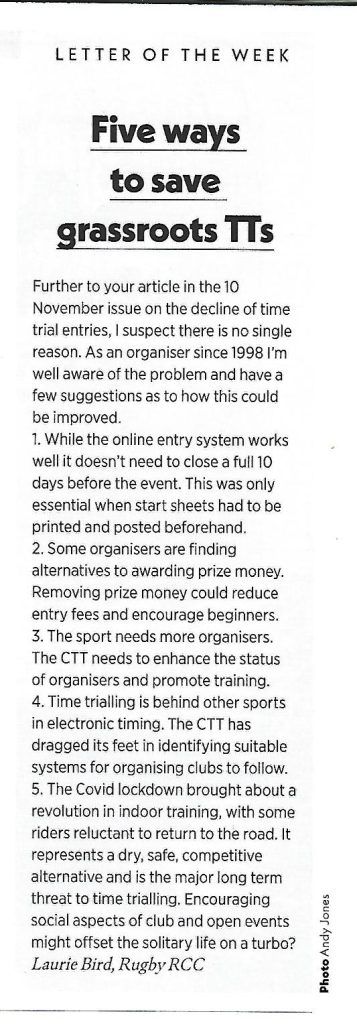Following a recent article on the decline of time trial entries I responded with a few points of my own. It was meant to be constructive, although partly critical of the CTT. However, CW edited by letter, sadly removing the bit about accepting late entries. My original letter is on the left, below, with the bits edited out shown in red. On the right is the article as it appeared in CW.
LB
Further to your article in the 10 Nov issue on the decline of time trial entries, I suspect there is no single reason. As an organiser since 1998 I’m well aware of the problem and have a few suggestions as to how this could be improved.
1. While the on-line entry system works well it doesn’t need to close a full 10 days before the event. This was essential when start sheets had to be printed and posted beforehand, but removing the postal requirement would allow a later closing date and more flexibility for competitors.
2. Even after the start sheet has been published (on-line of course) it should be possible for late entries to be accepted, particularly when riders find their entry to another event has been cancelled or even over-subscribed. Obviously there would have to be restrictions, but nothing insurmountable.
3. Some organisers are finding alternatives to awarding prize money. A prize of £25 or even £50 is trivial to competitors who have paid several thousands for a TT bike and the necessary equipment. Removing prize money could reduce entry fees by several £s and encourage beginners and ‘average’ riders who never win a prize.
4. The sport needs more organisers, particularly as it appears a daunting task often undertaken by older people who are not being replaced. The CTT needs to enhance the status of organisers and promote more organiser training.
5. Time trialling is behind other sports in terms of electronic timing. The CTT has dragged its feet in identifying suitable systems for organising clubs to follow. Worth bearing in mind that TT riders love their technology!
6. The Covid lockdown brought about a revolution in indoor training, with some riders reluctant to return to the road. It represents a dry, safe, competitive alternative and is the major long term threat to time trialling. Perhaps encouraging the social aspects of both club and open events might offset the solitary life on a turbo-trainer?
Laurie Bird
Rugby RCC

